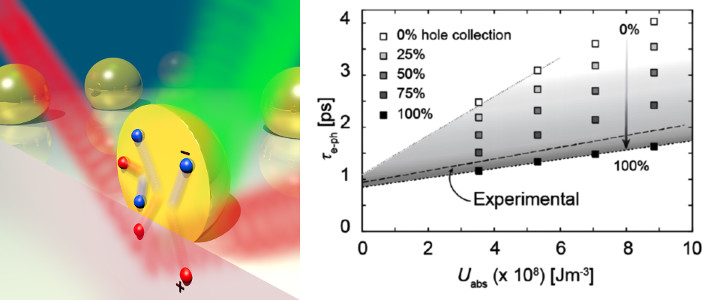High-efficiency Au-GaN hot hole injection published in Nature Materials

G. Tagliabue, J. S. DuChene, M. Abdellah, A. Habib, D. J. Gosztola, Y. Hattori, W.-H. Cheng, K. Zheng, S. E. Canton, R. Sundararaman, J. Sa and H. A. Atwater, “Ultrafast hot-hole injection modifies hot-electron dynamics in Au/p-GaN heterostructures”, Nature Mater. 19, 1312 (2020)
The efficient injection of hot carriers before their thermalization from a photo-excited metal into a semiconductor has been a long-standing bottleneck in plasmon-enhanced photocatalysis and photodetection. Gold is theoretically expected to generate a large population of energetic holes in particular, but experimental evidence of extracting these holes from gold has so far been missing. In this work, our first-principles calculations enable a comprehensive experimental demonstration of high-efficiency hole extraction from gold to p-type gallium nitride.
The key idea of this work is to use the rate at which gold cools down by electron-phonon relaxation on the picosecond time scale, as measured by ultrafast spectroscopy, as a thermometer and calorimeter to measure the temperature and energy in the gold. We performed first-principles calculations of the time evolution of hot carrier distributions in gold nanoparticles for several fractions of holes removed from gold. Comparing against experiment, these simulations suggest nearly 90% of the holes with enough energy to cross the Schottky barrier are rapidly transferred into gallium nitride! As a control, we confirm under the same conditions that for an insulator (sapphire) where carriers cannot be transferred, our calculations line up exactly with experiment for 0% hole extraction.
Additional experimental probes confirm the presence of injected holes in gallium nitride, but we show how first-principles calculations can quantify the fraction of extracted carriers with unprecedented fidelity. Overall, this work brings to light the untapped potential of hot-hole devices for plasmon-enhanced solar energy conversion.
